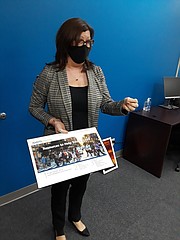Parolee intervention station opens
Suite 124 doesn’t seem like much from the outside: a clean downstairs office space in a corner of Coeur d’Alene’s Harbor Plaza, wedged between other nondescript offices in the mostly-full commercial space.
But inside, correction officials say they hope the services Suite 124’s new occupants provide will help strengthen a specific part of the community.
Evette Navedo, statewide manager for GEO, the private correction company that partnered with the Idaho Department of Correction for Coeur d’Alene’s connection and intervention station, said there are common issues people deal with.
This could include losing employment, how to pay bills, how to take care of kids, and how to deal with different responsibilities, she said.
"But there’s a difference there, with not having the appropriate social skills or coping skills to know how to navigate that," she said. "Our main approach is to take a cognitive behavioral therapy approach to really address those drivers that lead to that criminal behavior.”
The new connection and intervention station, one of four stations that opened statewide this week, will serve parolees and probationers facing crises that could trigger needs or opportunities to re-offend.
The Harbor Plaza site will provide support services to those rehabilitating their lives.
“We are set up to handle 60 to 75 at a time,” Navedo said. “That cycle can happen two to three times over the course of the year, so we could likely see over 200 to 250 referrals each year.”
The referral-based station will serve as an outlet for parolees and probationers struggling with housing, food and other resources to help keep them from re-offending.
John Andrich, acting District 1 probation and parole manager and a 13-year veteran of the Idaho Department of Correction, said people struggle with the same factors that originally sent them through the criminal justice system.
“We could have a single mother of two that is working two jobs and, through her life, has struggled with addiction,” he said. “Those everyday life stressors — children, two jobs, ‘How am I going to pay my rent?’ — all of those could be triggers to turn back to that coping mechanism of substance abuse. So timing will be crucial in this process," he said.
Andrich said getting them in touch with the right people that can not only help with the substance but with basic needs, pointing them into the right direction to assist with housing, day care and schooling, to turn jobs into a career.
"That’s where we make our big difference," he said. "That’s where we improve our community and give back to our community.”
Kirsty Thornton, program manager for GEO, said the tools at the new station’s disposal are not only vast but will be crafted to each individual, tailoring specific solutions to unique problems.
“When we get a new participant in the program, one of the first things we’re going to do is go through some assessments to figure out exactly what those needs are," Thornton said. "Those essential needs we want to address first, to identify those barriers. Once we remove barriers, we can start looking at some of those coping skills, impulsivity, employment, education."
The Harbor Plaza connection and intervention station on Hubbard Street came under scrutiny after concerns a proposed-but-since-dismissed location for the CIS on Coeur d’Alene Avenue placed the station near Sorensen Magnet school. That led some to wrongly believe another IDOC project — a yet-to-be-approved community re-entry facility — was being installed within arms’ reach of school children.
Navedo said the best way the community can help the probationers and parolees that reach out to the CIS is to provide support for people trying to change.
“These are individuals who are here already,” she said. “They’re already in our neighborhoods. You go to the store, they’re there. Their kids go to the same schools our kids go to. They go to the same church. But yet they’re dealing with a lot of these issues. Now, with us partnering with IDOC, they’re not dealing with them alone.”



